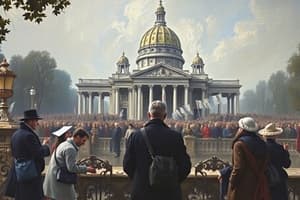Podcast
Questions and Answers
What is a key characteristic of America’s democracy according to Martin Gilens and Benjamin Page?
What is a key characteristic of America’s democracy according to Martin Gilens and Benjamin Page?
- Political decisions are made transparently and democratically.
- It is primarily driven by citizen engagement.
- Ordinary citizens achieve their desires solely when aligning with elite interests. (correct)
- It ensures equal representation for all social classes.
According to Matt Taibbi, which social issue exemplifies the inequities generated by America's political establishment?
According to Matt Taibbi, which social issue exemplifies the inequities generated by America's political establishment?
- Environmental regulations
- Healthcare access (correct)
- Public education funding
- Employment opportunities
Which political theory best describes the diversity of organized associations in early American politics?
Which political theory best describes the diversity of organized associations in early American politics?
- Hyper-pluralism
- Pluralism (correct)
- Libertarianism
- Authoritarianism
What major criticism does Matt Taibbi make regarding the treatment of different crimes in American society?
What major criticism does Matt Taibbi make regarding the treatment of different crimes in American society?
What principle did Alexis de Tocqueville observe that reflects the essence of pluralism in early America?
What principle did Alexis de Tocqueville observe that reflects the essence of pluralism in early America?
What aspect of war does Taibbi highlight when discussing societal inequities?
What aspect of war does Taibbi highlight when discussing societal inequities?
Which political concept suggests that various interest groups compete for power in America?
Which political concept suggests that various interest groups compete for power in America?
What outcome of debt forgiveness policy is criticized by Taibbi?
What outcome of debt forgiveness policy is criticized by Taibbi?
Which theory suggests that many organized interests compete on an equal basis with no single interest dominating policy for long?
Which theory suggests that many organized interests compete on an equal basis with no single interest dominating policy for long?
What term did Theodore Lowi use to describe the process where the government implements the wishes of all interest groups, leading to potential dysfunction?
What term did Theodore Lowi use to describe the process where the government implements the wishes of all interest groups, leading to potential dysfunction?
How do elite theorists critique pluralism and hyper-pluralism?
How do elite theorists critique pluralism and hyper-pluralism?
What is a common critique of hyper-pluralism regarding government policy?
What is a common critique of hyper-pluralism regarding government policy?
Which of the following is NOT a characteristic of elite theory?
Which of the following is NOT a characteristic of elite theory?
According to hyper-pluralism, what has happened to the nature of policymaking over time?
According to hyper-pluralism, what has happened to the nature of policymaking over time?
Which group is considered as having a significant influence according to elite theory?
Which group is considered as having a significant influence according to elite theory?
What is the core idea of pluralism regarding the struggles among interest groups?
What is the core idea of pluralism regarding the struggles among interest groups?
Which of the following best describes the relationship between business interests and policy-making as per the elite theory?
Which of the following best describes the relationship between business interests and policy-making as per the elite theory?
Flashcards are hidden until you start studying
Study Notes
Democracy and Inequalities
- Democracy in America is characterized as coincidental, often aligning with elite interests rather than genuine public consensus.
- Vast inequities exist across various sectors:
- Criminal justice favors harsh punishment for street crime, while white-collar crimes often go unpunished.
- War disproportionately affects lower socio-economic classes, sparing the wealthy elite.
- Healthcare creates fears of financial ruin due to medical expenses.
- Economic policies, like bailouts, primarily benefit Wall Street, leaving individuals facing foreclosure and student debt abandoned.
Theories of American Politics
- Political analysts are divided into three main theoretical systems: pluralism, hyper-pluralism, and elite theory.
Pluralism
- Rooted in Alexis de Tocqueville's observations, pluralism celebrates the diversity of organized associations in American politics.
- Ordinary citizens can form or join various interest groups, competing to influence policy.
- No single group maintains long-term dominance due to the competitive nature of interest representation.
Hyper-Pluralism
- Suggests that American politics has evolved from pluralism into hyper-pluralism, a state where the government caters excessively to numerous interest groups.
- Leads to contradictory policies, such as fossil fuel subsidies alongside carbon emission regulations, indicating a lack of coherent competition.
- Theodore Lowi terms this as interest-group liberalism, highlighting dysfunctional governance.
Elite Theory
- Elite theory posits that a small, wealthy class (the power elite) significantly influences governmental decisions, overshadowing broader democratic engagement.
- Elites can manipulate political outcomes through organized business and military interests.
- The theory points to overlapping networks among elites, including corporate and educational board memberships, which solidify their control over political processes.
Historical Context
- Noam Chomsky emphasizes the historical ongoing conflict between demands for greater freedoms and elite dominance in American society, showcasing a trend that has persisted throughout U.S. history.
Studying That Suits You
Use AI to generate personalized quizzes and flashcards to suit your learning preferences.




